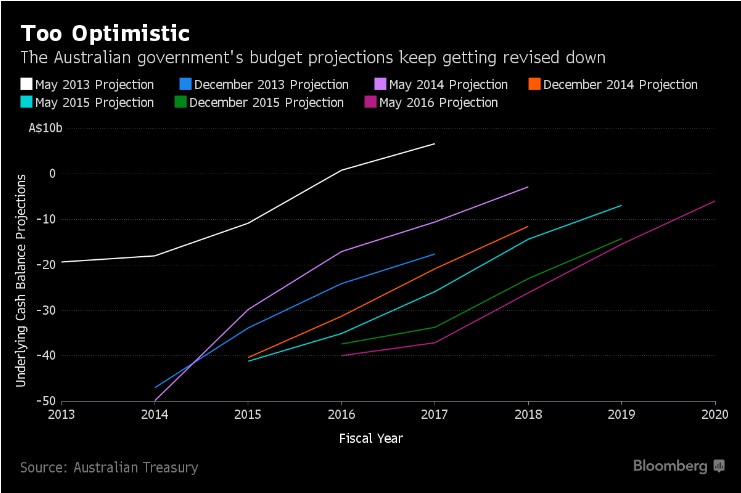Australia could be stripped of its top credit score by S&P Global Ratings as early as next month if the government's interim budget review shows further deterioration, according to BlackRock.
The mid-year economic and fiscal outlook, which for the past three years has been delivered in December, could be a "catalyst" for the country to lose its AAA rating, said Stephen Miller, the Sydney-based head of Australian fixed income at the world's largest money manager.
Australia is the highest yielding issuer among 10 nations with top ratings from the three major assessors, and a downgrade could lessen the appeal of Aussie debt for international investors who hold the majority of the country's sovereign notes.
The Turnbull government has struggled to rein in its fiscal shortfall as lower commodity prices have crimped revenues and parliament has stymied savings measures.
The budget has been in deficit since 2008 and isn't forecast to return to surplus until at least 2021, according to the fiscal plan released in May.
An election in July failed to break the legislative gridlock, prompting S&P to shift its outlook to negative and warn of a possible rating cut.
"Australian governments have been serial under-deliverers," said Miller, who has been investing in bonds for more than two decades. "If we persist with that, we might see the patience of the rating agencies tested to breaking point. There have been some positive developments in the last six months, but I think they've been few and far between."
The allure of the nation's securities for overseas buyers is already starting to wane, with growth in foreign holdings failing to keep pace with a debt pile that's projected to reach almost A$500 billion ($383 billion) by the end of June.
Government data indicate the proportion of federal securities held by non-resident investors in the second quarter fell to just 59 percent, the least since 2009, while bond auction figures show the average level of bidding at regular sales is the weakest in 14 years.
The government has been forced to revise its estimates on the budget repeatedly and the timeline for a return to surplus keeps getting postponed.
Back in 2013, then Treasurer Joe Hockey predicted that there would be a surplus of A$6.59 billion in the current fiscal year; in this year's May budget that was projected to have turned into a A$37.1 billion deficit.
S&P said in July that there was a one-in-three chance that it would lower Australia's credit rating within two years if lawmakers failed to agree proposals to balance the budget by the early 2020s.
It said "more forceful fiscal policy decisions" would be required and that the federal election -- which saw Prime Minister Malcolm Turnbull's Liberal-National coalition reelected with a razor-thin majority -- had dented the government's prospects for reining in the budget shortfall.
Moody's Investors Service currently has a stable outlook on its Aaa rating for Australia and said in August that it expected the nation's credit profile would "remain resilient" to risks.
Fitch Ratings said after the July vote that the situation was still consistent with a stable AAA score, "but political gridlock that leads to a sustained widening of the deficit would put downward pressure on the rating, particularly if the economic environment deteriorates."
S&P moved "pretty quickly out of the box" after the election, according to Miller. If the mid-year update fails to impress, "we might see an S&P action pretty soon after that," he said.
The warning from S&P seems to have had some effect on parliament, with Turnbull in September convincing the main opposition Labor Party to back a package of laws that will result in A$6.3 billion of savings. Scott Morrison, who succeeded Hockey as Treasurer last year, in August warned the budget must be returned to the black to insulate against future shocks.
A resurgence in commodity prices, albeit from the lowest levels in more than a decade, could also help the nation's public finances. For the first time in six years, the price of Australian exports has risen for three straight quarters, boosting national income and tax revenue.
The Reserve Bank of Australia on Friday said it sees a better short-term outlook for key trading partner China and a resource-price windfall for the economy.
"The outlook for commodity prices, particularly coal prices, is more positive than previously thought," the central bank said, while adding that the current spot prices are unlikely to be sustained.
This year's tripling in the??price of metallurgical coal and a 50 percent surge in iron ore are helping boost Australia's terms of trade, which haven't recorded an annual increase since 2011.
BlackRock's Miller said that while the rebound in coal and iron ore held out the prospect of increased government revenue, he doubted that it would be sufficient, or that it would come soon enough. With regard to the country's AAA credit score "we're sailing very close to the wind," he said.







